

Spencer Baldwin
Self-Sabotage: Why We Hurt Ourselves & Anyone Who Loves Us — Yay With Me. We’re thinking about calories all wrong. - Matthew Boutte - Medium. How unprocessed trauma is stored in the body - BioBeats - Medium. When all is well, our brain is the greatest supercomputer on earth.
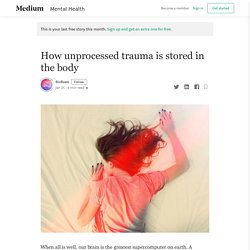
A complex network of about 100 billion neurons, it’s not only great at processing and organising information — it’s really, really fast. Every second, somewhere between 18 and 640 trillion electric pulses are zipping through your brain. This matrix carefully encodes and stores your memories and experiences, collectively making up the unique mosaic of you. But what happens when a shock disrupts this system? And why is it that this shock or trauma can linger in the body and mind, affecting your health for years to come? Untreated past trauma can have a big impact on your future health. Additionally, the risk of developing mental and physical health problems increases with the number of traumatic events you’ve experienced. I stopped writing to-do lists – and learned to enjoy what I’d already achieved. As the oldest of three daughters, I always felt an acute sense of responsibility and a weight on my shoulders to prove myself.

I had to be better than everyone else, excel against the boys and show that I was worthy of my place in the world. Yet, as relatives and strangers speculated over my parents’ future and lack of a son to provide for them in old age, I had a crushing and debilitating foreboding that I would not achieve anything. Growing up in India, my mother made sure that we had the best education, even as my parents made monumental sacrifices, living in tiny one-bedroom rented houses, with no holidays or luxuries.
Does sugar cause depression? - Feed Your Brain - Medium. 20+ Tips to Pick the Right Airline Seat From a Guy Who Flies More Than Some P... What is Forgiveness? This month, Greater Good features videos of a presentation by Fred Luskin, a pioneer in the science and practice of forgiveness.

In his talk, Luskin discusses why forgiveness can be so hard to practice and explains his research-tested “nine steps to forgiveness” that have helped thousands of people worldwide give up their grudges, from Northern Ireland to Sierra Leone to communities across the U.S. Why “eat less, move more” doesn’t work for weight loss. Humanwindow. Regret can seriously damage your mental health – here's how to leave it behind. Chronic inflammation removes motivation by reducing dopamine in the brain. Why do we feel listless when we are recovering from an illness?
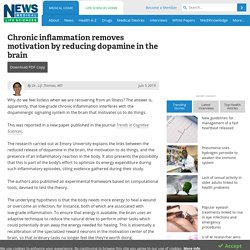
The answer is, apparently, that low-grade chronic inflammation interferes with the dopaminergic signaling system in the brain that motivates us to do things. The research carried out at Emory University explains the links between the reduced release of dopamine in the brain, the motivation to do things, and the presence of an inflammatory reaction in the body. It also presents the possibility that this is part of the body’s effort to optimize its energy expenditure during such inflammatory episodes, citing evidence gathered during their study. The authors also published an experimental framework based on computational tools, devised to test the theory. The underlying hypothesis is that the body needs more energy to heal a wound or overcome an infection, for instance, both of which are associated with low-grade inflammation.
Image Copyright: Meletios, Image ID: 71648629 via shutterstock.com Source: Treadway M. How many steps a day do you really need? Spoiler: It isn't 10,000. Hypnosis for Better Sleep - Sleep.org. Hypnosis may conjure up images of people being made to quack like a duck onstage, but the reality is that it’s typically much more boring—and sleep-inducing.
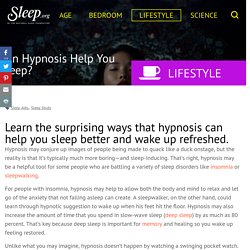
That’s right, hypnosis may be a helpful tool for some people who are battling a variety of sleep disorders like insomnia or sleepwalking. For people with insomnia, hypnosis may help to allow both the body and mind to relax and let go of the anxiety that not falling asleep can create. A sleepwalker, on the other hand, could learn through hypnotic suggestion to wake up when his feet hit the floor.
Hypnosis may also increase the amount of time that you spend in slow-wave sleep (deep sleep) by as much as 80 percent. That’s key because deep sleep is important for memory and healing so you wake up feeling restored. Unlike what you may imagine, hypnosis doesn’t happen by watching a swinging pocket watch. People-pleasing can be a result of trauma. It’s called ‘fawning’ — here’s how... When I recently wrote a Twitter thread about my people-pleasing tendencies, I didn’t at all expect for it to go viral.

Yet that’s exactly what happened. As I shared my experiences with trauma and people-pleasing, I was hit with an avalanche of emotion. So many of you could relate to this phenomenon known as “fawning,” and it became immediately clear that we needed this resource to exist outside of Twitter. So let’s keep the conversation going.
Feelings_inventory. How a positive mind really can create a healthier body. By David Robson “OUR minds aren’t passive observers simply observing reality as it is; our minds actually change reality.
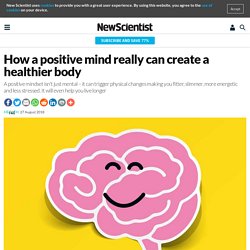
The reality we experience tomorrow is partly the product of the mindsets we hold today.” That’s what Alia Crum told global movers and shakers at this year’s World Economic Forum in Davos, Switzerland. It may sound like New Age nonsense, but Crum, who heads the Mind & Body lab at Stanford University in California, can back up her claims with hard evidence showing the mysterious influence the mind has over our health and well-being. The Science of Happiness: Why complaining is literally killing you. By Steven Parton, From CuriousApes.com Sometimes in life, all the experience and knowledge simmering around in that ol’ consciousness of ours combines itself in a way that suddenly causes the cerebral clockwork to click into place, and in this fluid flow of thought we find an epiphany rising to the surface.
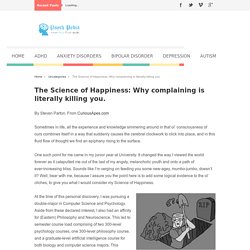
Skin conditions. Confidence and speaking aloud. Managing grief. Difficult childhood memories. Fears and phobias. Blushing and tics. Sex and relationship issues. Social situations. Teen Brain. Identity and sexuality. Increasing activity. Alcohol and drug use. Positively minded. Exams and being assessed. Disordered eating. Food related issues. Sleeping better. Assertiveness (less passive) Pain management.
Assertiveness (less aggressive) Panic and feeling overwhelmed. Managing workload. Social connection. Anger. Body image. Compulsive behaviours. Gaming. Self esteem, introversion. Feeling low. Oppositional Defiance. Professionals-literature.